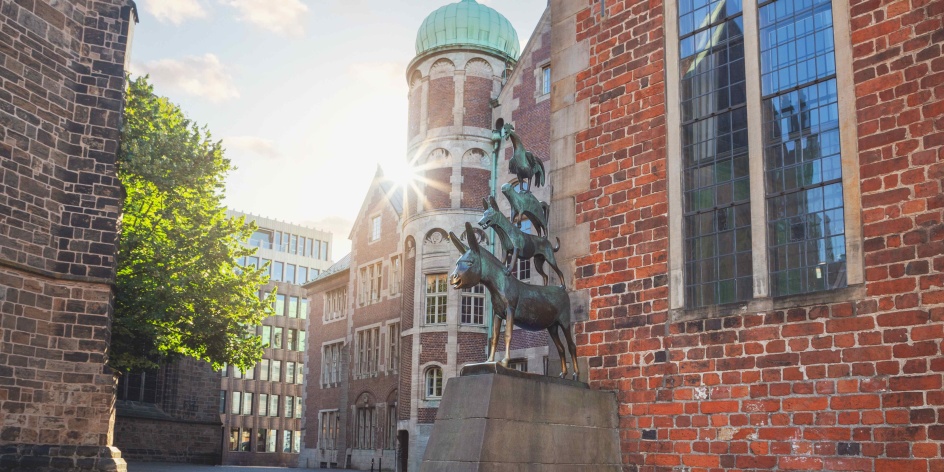
© WFB / Carina Tank
1,200 years of tradition and cosmopolitanism shape Bremen, the Hanseatic city on the Weser. The old trading city with its historic centre around the market square exudes the flair of a young metropolis. And yet anyone who embarks on a journey through time with open eyes will witness its long and exciting history. Look forward to Bremen's sights. There is much to discover!
YouTube-Dienst aktivieren und Datenübertragung zustimmen.
Mehr Informationen zum Datenschutz auf www.bremen.de befinden sich in der Datenschutzerklärung
Hinweis: Mit Aktivierung dieses Inhalts werden Cookies gesetzt
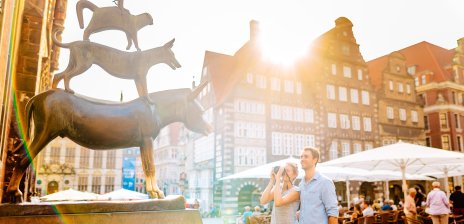
© WFB/Jonas Ginter
The magnificent Weser Renaissance town hall and the venerable figure of Roland on the historic Market Square remain unmistakable. They have embodied the citizens' will for independence since 1404. The town hall and Roland are protected by UNESCO as a unique world heritage site, but the Schnoor Quarter - Bremen's oldest quarter - the unusual architecture of the tradition-steeped Böttcherstraße or St. Peter’s Cathedral are also unparalleled. You don't even need a city map for a tour of the most important sights. 2,000 brass and steel nails lead from Liebfrauenkirchhof to the Market Square and Schnoor Quarter to Böttcherstraße. And don't forget to pick up a portion of luck at the Bremen Town Musicians!
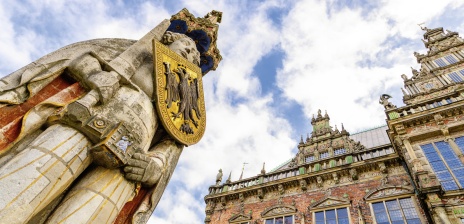
Together with Roland, the town hall is part of Bremen's Unesco World Heritage.
© WFB
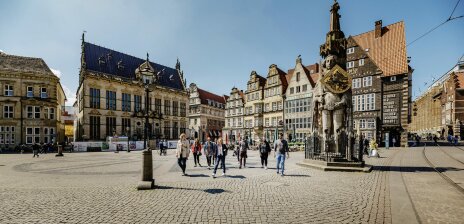
Created in 1404, it is one of the oldest public squares in the city.
© WFB / Jonas Ginter
The starting point of the route is the Hanseatic city's secret landmark. With its back to the town hall and its face to the Liebfrauenkirchhof, the bronze statue of the Bremen Town Musicians designed by Gerhard Marcks presents itself. The fairy tale of the legendary figures is known all over the world and has been as closely associated with Bremen as the town hall and Roland since the Brothers Grimm. Anyone who touches the donkey's legs is granted a wish.
Only a few steps away from the Town Musicians, also on the west side of the Town Hall, is the entrance to Germany's oldest wine cellar. In Bremen's Ratskeller, the cellar master has been pouring fine wines since 1409. With 650 different varieties, it houses the largest collection of German wine.
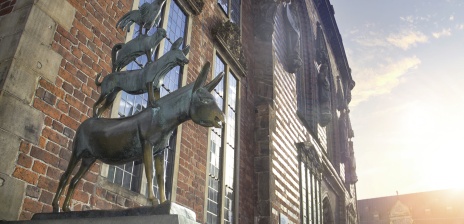
© WFB / Carina Tank
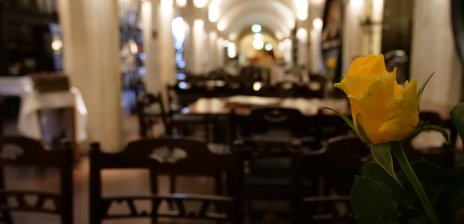
© WFB - MKA
If you continue to follow the brass and steel nails, your path will lead you from one sight to the next. Whether it's the Bremer Geschichtenhaus, the Paula Modersohn Becker Museum, the Schütting or the pigs in Sögestraße - there's plenty to discover in Bremen's city centre. But there are also numerous highlights beyond the city centre that you should visit. In the Focke Museum you can follow in the footsteps of Bremen's history, the Universum® Bremen invites you to marvel and participate, while in the Überseestadt you can see how past and present blend together between old harbour buildings.
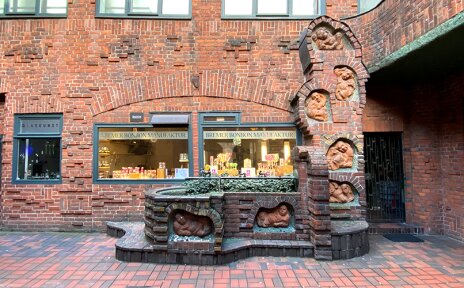
© WFB/Ingrid Krause
Bernhard Hoetger dedicates his artwork to the well-known story of the seven "lazy" sons of a farmer. They found no work in Bremen and went off into the world: rich in knowledge and experience, they returned years later and applied modern methods in their father's farm. You will find the fountain in a small courtyard of the Paula Becker Modersohn House in Böttcherstraße. By the way: the four Town Musicians also adorn the fountain.
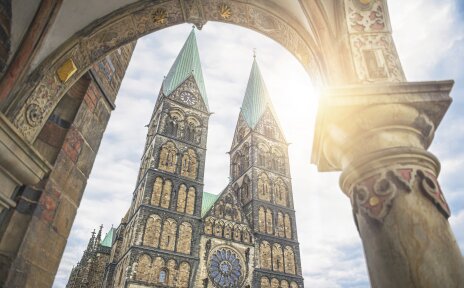
© WFB / Carina Tank
Facing south-east from the market square, St. Petri's Cathedral lies between the town hall and the Bürgerschaft. The construction of the Romanesque church made of sandstone and brick dates back to the 11th century. Since then, the church has undergone numerous alterations and extensions. The building has been a listed building since 1973. In addition to the imposing exterior, a look at the interior of the church is worthwhile, as is a visit to the cathedral museum and the Bible garden.
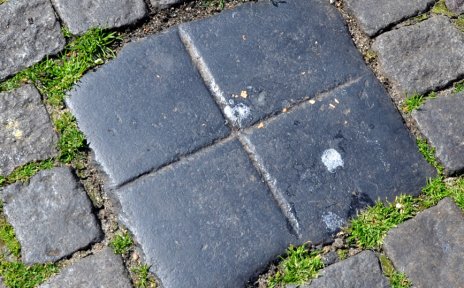
© bremen.online GmbH / MDR
The "Spuckstein" (spitting stone) is an inconspicuous dark stone square set into the pavement of the Domshof. Its history is all the more exciting: the stone commemorates the legendary murderess Gesche Gottfried, who poisoned 15 people with arsenic. It marks the spot where her head was cut off on 21 April 1831. Out of disgust at her crimes, the people of Bremen still like to spit on the stone as they pass by.
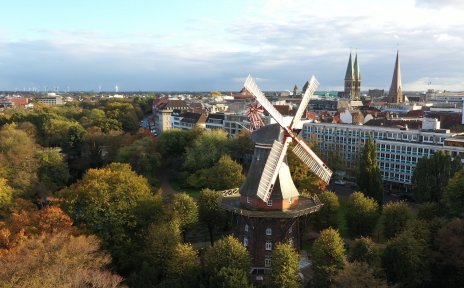
© WFB / MKA
When visitors first arrive in Bremen's city centre from the train station, they are surprised by the sight of the large, roughly 100-year-old Herdentorswallmühle in the middle of the city. Embedded in a sea of seasonal flowers, the mill in the Wallanlagen is one of the most photographed sights in the city. Where flour was still ground until 1950, there is now a restaurant and it is possible to visit the structure.
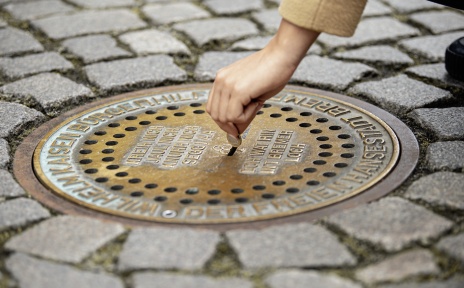
© WFB / Carina Tank
So you hear wierd voices on the market square? Barking, meowing, cock-a-doodle-do or hee-haw screams are quite normal in Bremen: they are part of the hole of Bremen! A drain cover next to the Bürgerschaft has been converted into a donation money box. After a few coins have been inserted, the sounds of the four Town Musicians are heard as a reward. The coins go to the Wilhelm-Kaisen-Bürgerhilfe for its social projects.
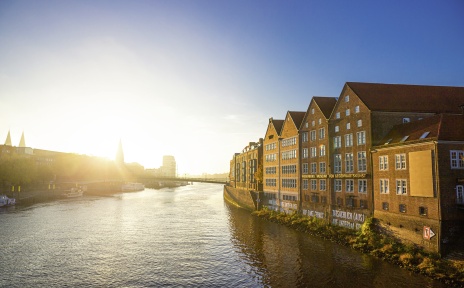
© WFB / Carina Tank
The Schlachte - located in the heart of Bremen directly on the Weser - has experienced a lot in its 800-year history and shown many faces. As a former waterfront harbour, it has been transformed into today's maritime promenade with numerous restaurants, bars and pubs. With its unique flair, the Weser promenade and the gastronomic offers, the Schlachte is a meeting place for all generations.
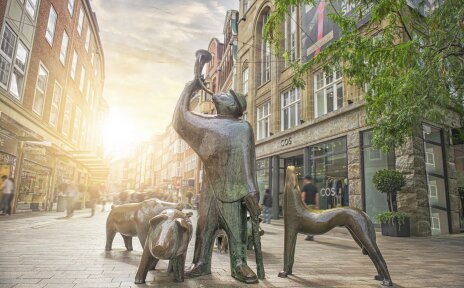
© WFB / Carina Tank
For many people in Bremen, the Shopping starts at the bronze pigs at the beginning of Sögestraße. Since 1974, they have been a popular meeting place from which to start your shopping spree. From the Wallanlagen to Obernstraße, you will discover a variety of shops in the shopping mile.
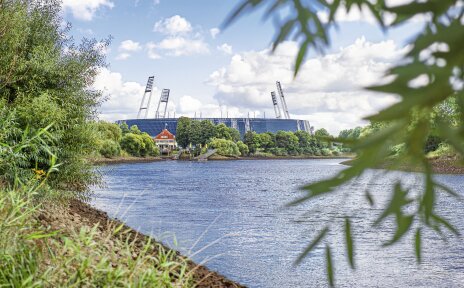
© WFB / Carina Tank
"Where the Werra and the Fulda kiss" is where the Weser rises to run northwards through Bremen like a lifeline. From Obervieland in the southeast to Vegesack in the northwest, the Weser is omnipresent as a cross-section of the city. So you live either to the right or left of the Weser, walk, jog, skate or cycle along it, enjoy the sun on the dyke, stop off somewhere at the Schlachte or jump straight in for a swim.
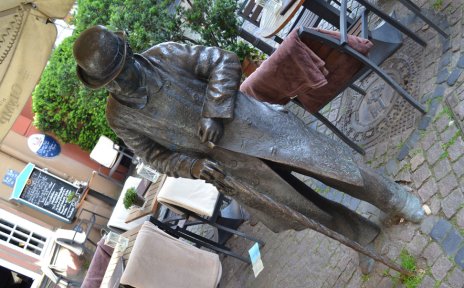
© bremen.online GmbH/MDR
Heini Holtenbeen is a legend in Bremen. He was born here in 1835 as Jürgen Heinrich Keberle and suffered a stiff leg and slight brain damage from an accident. From then on, he could be met daily on Bremen's market square, where he took the cigars from the merchants in front of the stock exchange to make new ones from the leftovers. The bronze statue in the Schnoor Quarter commemorates him.
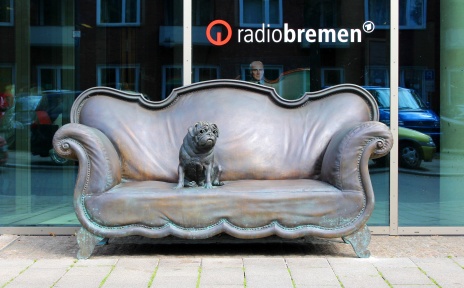
© Radio Bremen - Martin von Minden
A popular photo motif is the bronze monument in front of the entrance to Radio Bremen's broadcasting centre on Diepenau. The sofa, erected in 2013, commemorates the humourist Vicco von Bülow, better known as "Loriot". The original green Loriot sofa from his TV series is in the foyer of Radio Bremen. The pug on the bronze replica reminds us that Bülow was an enthusiastic lover of this dog breed.
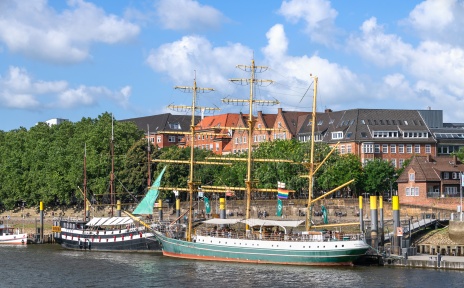
© WFB / Carina Tank
The famous green sailing ship "Alexander von Humboldt" has been permanently moored at the Schlachte in Bremen since the beginning of 2016. It has been in operation as a restaurant and hotel ship in the Europahafen since May 2015.
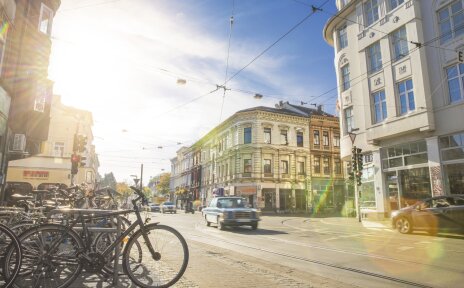
© WFB - Tank
A variety of cultural attractions, shopping opportunities and a unique, alternative charm characterise this part of town. The area around Ostertorsteinweg between Goetheplatz and St.-Jürgen-Straße is affectionately called "the quarter" (1/4) by all Bremen residents. Life pulsates here day and night!
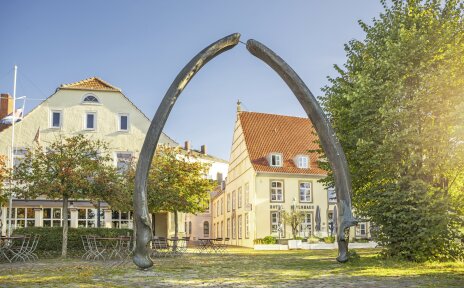
© WFB / Carina Tank
In Vegesack, about 25 kilometres from Bremen city centre, lies the "Maritime Meile". On the Weser promenade, maritime history comes alive with museums, a beautiful park, maritime monuments and historic ships.
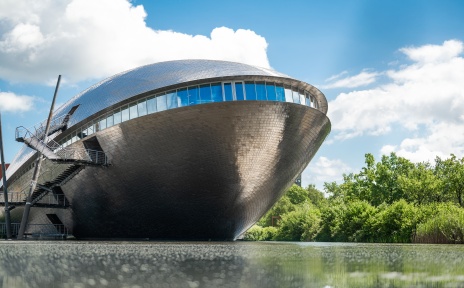
© WFB / Jonas Schmidt
The whale-shaped Universum Bremen near the university is not only an absolute architectural highlight! Here, knowledge is conveyed interactively and hands-on. The permanent exhibition deals with the topics of man, nature and technology, while special exhibitions, science shows, lectures and workshops focus on changing themes.
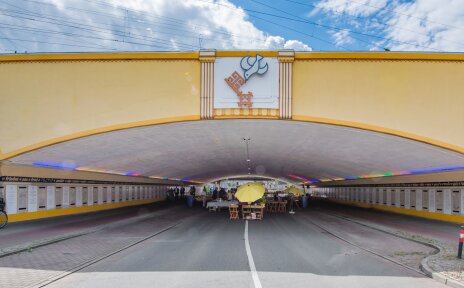
© Walter Tietze
The Bremen Friedenstunnel (Peace Tunnel) has become a special place not only for the citizens of Bremen, but also for numerous tourists who visit places of interest and significance in the city. The Peace Tunnel is a publicly accessible structure near Bremen's main railway station. With the artistic peace sign, a place was created to give people hope for peace, understanding, tolerance and the courage to live together.

© WFB / Melanka Helms-Jacobs
An entire district in transition - experience a harbour district rich in tradition at the pulse of the present! Stroll along the Europahafen, marvel at the boats, enjoy great sunsets on Waller Sand and discover culinary highlights. Experience one of the largest urban development projects in Europe with your own eyes.
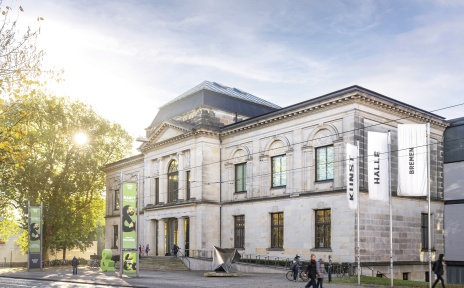
© WFB/Carina Tank
Art and technology, Bremen and the world, history and the future - in Bremen there are a multitude of houses that inspire and impart knowledge.

© WFB/Ingrid Krause
Bernhard Hoetger dedicates his artwork to the well-known story of the seven "lazy" sons of a farmer. They found no work in Bremen and went off into the world: rich in knowledge and experience, they returned years later and applied modern methods in their father's farm. You will find the fountain in a small courtyard of the Paula Becker Modersohn House in Böttcherstraße. By the way: the four Town Musicians also adorn the fountain.

© WFB / Carina Tank
Facing south-east from the market square, St. Petri's Cathedral lies between the town hall and the Bürgerschaft. The construction of the Romanesque church made of sandstone and brick dates back to the 11th century. Since then, the church has undergone numerous alterations and extensions. The building has been a listed building since 1973. In addition to the imposing exterior, a look at the interior of the church is worthwhile, as is a visit to the cathedral museum and the Bible garden.
Bremen is the greenest city in Germany! So it's no wonder that many Parks and Recreation invite you to linger in nature.
Not far from Bremen's main railway station, the Bürgerpark is the green heart of Bremen. With attractions such as animal enclosures, boat hire, boules courts and a Finnbahn, it invites both children and adults to spend time in the fresh air. The Rhododendron Park also has an extraordinary variety of plants to admire all year round in the park and greenhouses. The month of May is particularly beautiful, when the multi-colored rhododendrons are in full bloom.
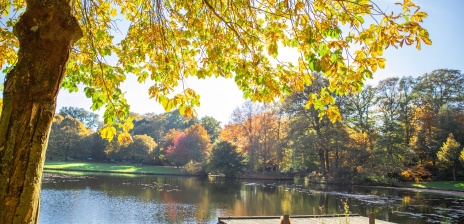
© WFB / Carina Tank
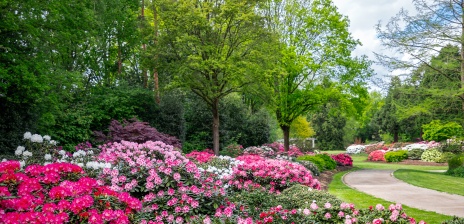
© WFB/Tank
YouTube-Dienst aktivieren und Datenübertragung zustimmen.
Mehr Informationen zum Datenschutz auf www.bremen.de befinden sich in der Datenschutzerklärung
Hinweis: Mit Aktivierung dieses Inhalts werden Cookies gesetzt
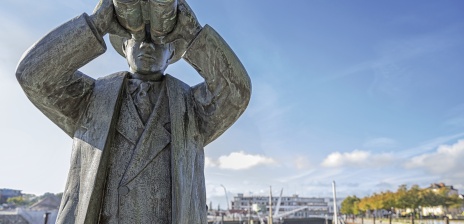
© WFB/ Carina Tank
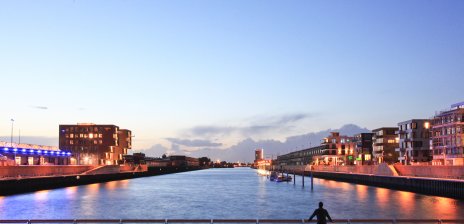
© WFB / Jens Lehmkühler